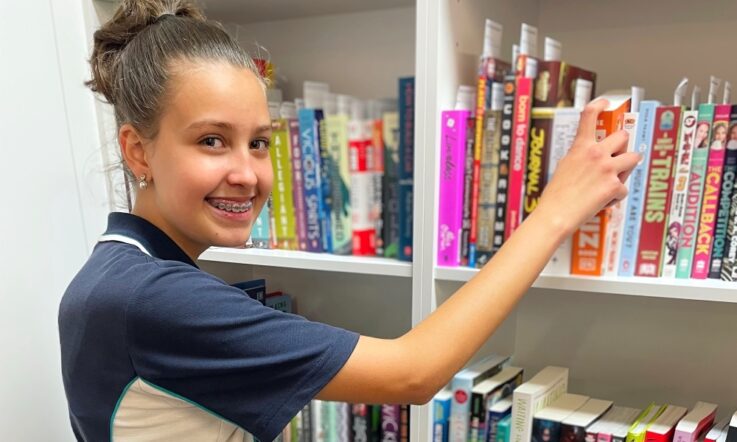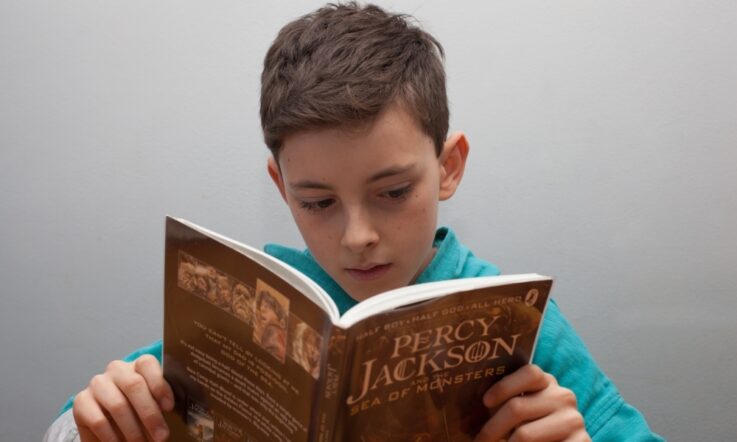Research has shown that students who enjoy reading for pleasure are more likely to gain greater skills, which in turn provides better scaffolding for further learning in all subjects and areas.
So, how can schools encourage students that are capable readers, but have no interest in reading for pleasure, to read more frequently? This is the underlying question that drove the research project of English teacher Edwina West.
West was named the Reading Australia Fellow in 2021. The $15,000 Reading Australia Fellowship, presented by the Copyright Agency’s Cultural Fund, supports a teacher of English and/or Literacy with at least 5 years’ experience to undertake research to enhance their skills and the skills of others.
West’s Fellowship research project focused on combating aliteracy (that is, a capable reader’s disinterest in reading) with Australian literature in her school setting. She is an English teacher at Oakhill College, a Catholic independent school in New South Wales that educates boys only in years 7-10, and boys and girls in years 11 and 12.
‘In terms of the reading culture, there is a huge reading for pleasure push from the executive of the school,’ West shares with Teacher. ‘They value reading, our principal really values reading.’
‘I would say though that the reading culture ultimately is mixed. You have the ultra-enthusiastic readers and then the aliterate reading refusers. And that's probably similar to most schools, I'd say.’
Resources to assist with book recommendations
Through her Fellowship, West has created a resource to help teachers and teacher librarians better select books for students.
‘It stemmed from my own experience in the classroom teaching really able students – students who were easily getting As in English, but were aliterate (refused to read) or even had a desire to read, but didn't know where to start. They maybe had been really avid readers when they were in primary school or even in lower high school, but as they moved into year 10 and above, they had lost that habit or urge. So, I thought it would be important to develop those resources because I wanted to use them, but then I also thought others might benefit,’ West shares.
She has since created multiple resources. They include live Google documents with a range of Australian book recommendations based on reading age and themes of interest and a short student questionnaire to give teachers insight into their reading interests. Her website also shares information about aliteracy and different strategies that could be implemented in school settings.
Australian books popular amongst students at Oakhill college include titles from author Tristan Bancks such as The Fall, Two Wolves and Cop and Robber. Fantasy and dystopian books are an overwhelming popular genre, and many students enjoy reading sports biographies too. Some younger readers at the school enjoy reading Morris Gleitzman’s Once series.
Modelling reading for pleasure
Building a school reading culture can be challenging and involves continued buy-in from staff, students and the wider school community.
West says encouraging reading for pleasure is a task that can often be thought of as someone else’s responsibility. ‘And Margaret Merga … she really talks about how that’s an “orphaned role”, because the English teacher might say it’s the teacher librarians’ job,’ she shares. ‘Parents tend to not be as interested in reading for pleasure the older the child gets – that’s the trend that we see.’
In a 2019 episode of our podcast series The Research Files, we spoke with Dr Margaret Merga from Edith Cowan University about building a school reading culture. In the episode, she shared that ‘where we have staff reading, again, that can have a really powerful influence on students … although it is obviously important to equip parents to be strong models in the home – it's also really important that we think about what we can do at a school level, because we need to have staff showing that reading is something you can choose to do for the purposes of enjoyment’.
Implementing initiatives to encourage staff to read for pleasure can be an effective strategy for building a school reading culture. One book by an Australian author West has read and would recommend to other teachers is The Dictionary of Lost Words by Pip Williams. She also recommends Hamnet by international author Maggie O’Farrell.
‘I think the number one thing that schools need to do if they're trying to build a reading culture is get the staff to buy-in first. It's about educating staff about why reading is important and also having parents' buy-in. If young people see the adults around them buying into the reading culture, then it's going to naturally follow.’
Think about a book you recently recommended to a student. What informed your decision to recommend this book?
When was the last time you read a book for pleasure? Did you take the opportunity to share this with students or colleagues?



